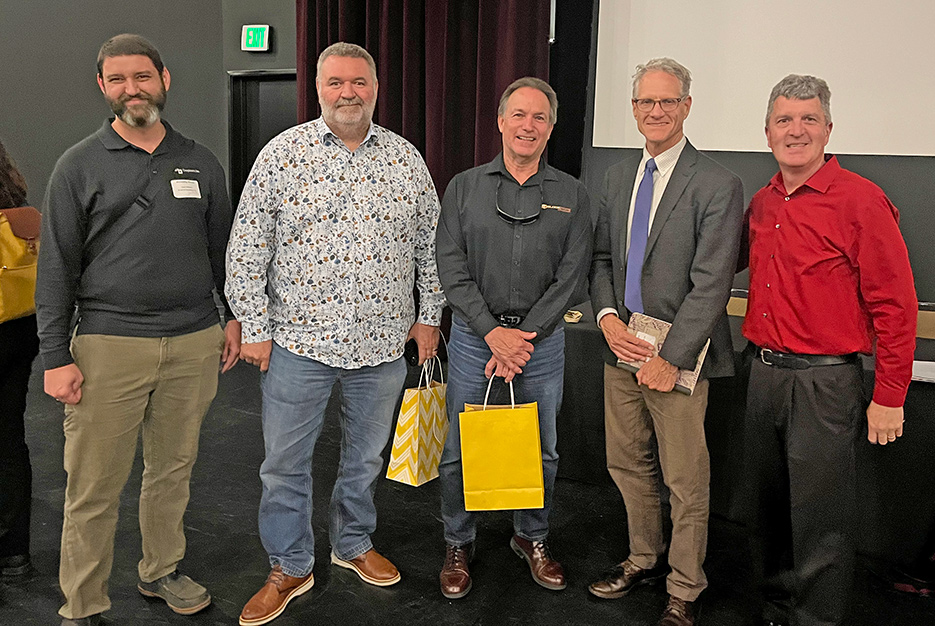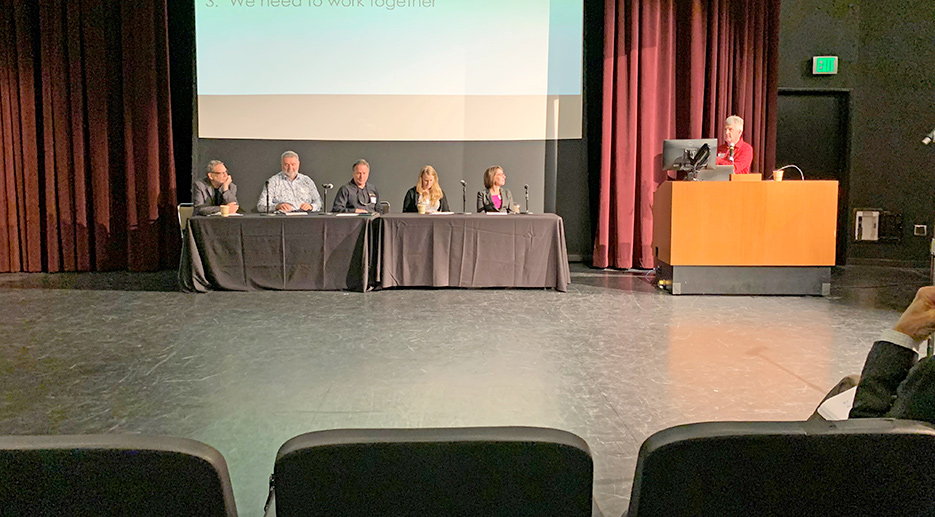Preventing Silicosis Conference Held at UCLA
Jim Hieb
Natural Stone Institute
Photos ourtesy Natural Stone Institute
For over 20 years the NSI board of directors and safety committee have invested vast resources to support silica training and industry advocacy for silicosis awareness and prevention. That commitment has been especially evident in the past sixteen months as countless hours have been spent both supporting the fabrication community impacted by regulatory pressures and defending natural stone.
California is at the center of attention in the United States, with confirmed silicosis cases among countertop workers now exceeding 140. While deaths are also slowly increasing, nearly twenty workers have received lung transplants. Only 13% of the silicosis cases reported involved employees with access to health insurance or workers compensation coverage. The plight of these workers is magnified in that they often have few options to seek employment at compliant fabrication facilities who meet legal business requirements and provide an emphasis on employee safety.
In May, I joined several NSI members to attend a Preventing Silicosis conference hosted on the campus of the University of California Los Angeles (UCLA). The event was the brainchild of Dr. Robert Harrison, a Public Health Medical Officer with the California Department of Public Health (CDPH). He has peer reviewed several scientific articles on silicosis and personally invested time to bring industry to the table with other stakeholders involved. “Dr. Bob,” as he is known, has become a resource for NSI staff to help build relationships within both public health and Cal/OSHA.
 |
|
From left: NSI members Dolan Williams (B&W Compliance), Ted Sherritt (FloForm), and Nate Kolenski (Block Tops) join Cal/OSHA’s Michael Wilson and Jim Hieb during the event. |
The attendees at this event represented a broad cross-section of stakeholders, including public health officials, Cal/OSHA workers, the medical community, fabricators and distributors, and industry trade associations. Media and trial lawyers were also in attendance, along with key personnel from the Yale School of Medicine, who have been contracted by NSI and ISFA to help with industry data collection and guidance.
NSI and ISFA participated in two panel discussions providing insight into the industry, available training resources, and perspectives on next steps. The keynote speaker was Dr. Ryan Hoy, who provided perspectives and lessons from Australia. Following the full-day conference, NSI participated in a smaller invitation-only half day working meeting, which allowed for open dialogue about the following:
What do we want to see happen to reduce/eliminate silicosis?
What are the strategies discussed during the full-day conference which may improve the situation?
What structural barriers will need to be addressed?
UCLA will produce a report in early summer with the collective feedback gathered.
Why was it important for NSI to participate in this event?
Educating key stakeholders. This event allowed us the opportunity to share insight into the industry and training resources that are available. It also provided the opportunity to show the public health community that most of the industry is committed to employee safety and safe work practice that can help prevent silicosis. Many in the public health community only know the companies who are utilizing dry methods with minimal engineering controls, so our involvement with the conference is a continuation of advocacy and educational work and proof of effective proactive efforts being done by industry.
Making introductions. While NSI has several friendly relationships with Cal/OSHA, connecting the certified industrial hygienist and pulmonary medical experts on the Yale team with Cal/OSHA has led to several new discussions that would not have been possible without these introductions.
Support from Cal/OSHA to:
- Engage in broader discussions about the new Air Exposure Monitoring Guidance document recently published by Yale/NSI/ ISFA.
- Address problems which existed in exposure data utilized by government officials when they implemented the Emergency Temporary Standard (ETS) in December 2023.
- Consider specific amendments to the ETS and draft permanent language.
- Discuss the stone silica thresholds (10% for natural stone) which were selected arbitrarily.
- Consider an alliance program for NSI to assist training federal and Cal/OSHA officials about various aspects of the industry.
Building relationships with leading California officials. We must never underestimate the importance of meeting people face-to-face! Those in-person meetings often lead to better virtual discussions and help everyone better appreciate that industry’s concern for employee safety is equal to those within the public health industry who are on the front lines with impacted employees.
The silica discussion will continue. We should all be proud that our industry is at the discussion table.
 |
|
UCLA Conference on Preventing Silicosis: NSI participates in a panel discussion to share insights from the natural stone industry. |
My very best!
– Jim Hieb
CEO / Executive Director
Natural Stone Institute